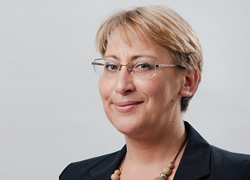BLOG: To mark World Refugee Day, Dr. Cristina Devecchi blogs about the importance of education for refugee children
Date 20.06.2018
20.06.2018
Today (20 June) is World Refugee Day. Among the many pressing issues, the education of refugee children is one we need to focus on both in regard to the short and the long term impact of our actions. I want to raise awareness of the need to capture the children’s formal and informal learning achievements, and the value that current providers add to the challenge of including refugee children in school.
Poverty, natural disasters and war are the key causes why adults and children flee their homes and country to find safe refuge elsewhere. The numbers are growing and concerning, 65M are displaced/refugees; 61% are under the age of 26; 40M young people are not in education.
While refugees can travel long distances, the first port of call is usually a bordering country. Lebanon is a small country (10,452 km2) , two thirds the size of Northern Ireland with an estimated population of 6 million people. 1M are Syrian refugees registered with UNHCR. At the latest count (UNHCR, 2017) done in 2016, 1 in 6 residents in Lebanon was a Syrian refugee. 500,000 of the registered refugees are children.
This is a staggering number. And the number of children will grow as more are born among a population which has been settled, in some cases, for the last 6 years. Even more concerning is that, 250,000 children are NOT in school.
Schools are safe havens
Being at school ensures that the children receive the basic education they deserve and to which they have a right to under both the UN Convention on the Rights of the Child (UNCRC, 1981), and the 1951 Convention relating to the status of refugees (UNHCR, 1951) Article 22 international legislation.
Being in education, and, above all, being in a place we can call school, offers children more than just the basics in reading, writing, Maths, Arabic and Science. Schools can be safe places where trained adults can follow the children, liaise with families and authorities, and provide the children with the educational and emotional support they need and deserve.
Children are robbed of their childhood, not just of their education
For those 250,000 children who are accounted to be in school, there are a number of ways in which they are provided with an education. Some might be run by the Lebanese Ministry of Education in conjunction with international bodies, local and international NGOs, and/or in collaboration with any of the many universities, such as the American University of Beirut (AUB) or the Lebanese University.
Integration is challenging when you don’t even have the basics
For those who are in public schools, integration remains difficult. Schools run two shifts: the morning shift for Lebanese children and the afternoon shift for Syrian refugee children who, despite their age, do not have the basic knowledge to join their Lebanese peers.
‘Their aim is to survive when they first come’ – I interviewed the educational field officer who had been working with refugee families and their children for over six years. She explained that while at the beginning it was hard to persuade parents to send their children to school, a sense of resignation about the challenge of not returning home soon made parents seek out for access to education for their children.
But providing education for all Syrian refugee children is a challenge.
· First of all, it is the number of children requiring access to education. In one of the towns I visited, three schools provide a second shift education to over 2,000 Syrian refugee children.
· The second challenge is to ensure they attend classes at the ‘right level’ accommodating their knowledge and understanding rather than their age.
· The third challenge is to ensure that on leaving the NGO’s Accelerated Programme, they can successfully enter the Lebanese school system.
‘You left with no papers; you left with your mind only’
But the key challenge is the lack of a system to permanently and safely capture the children’s learning and the NGOs’ and school’s work and efforts.
The #BlockchainEducationalPassport UN UNITE Global Challenge aimed to provide a technology-based innovative solution to the need not only to capture the children’s learning, but also to provide them with a permanent and certified proof of their learning. Based on a previous Whitepaper (Devecchi, et al., 2017), the passport will make use of smart contracts and bring together computer scientists, blockchain innovators, educators, NGOs and other humanitarian associations to ensure that refugee children have their learning achievements acknowledged and certified wherever they would find themselves to be throughout their lives.
To find out more about the #BlockchainEducationalPassport please make contact with cristina.devecchi@northampton.ac.uk